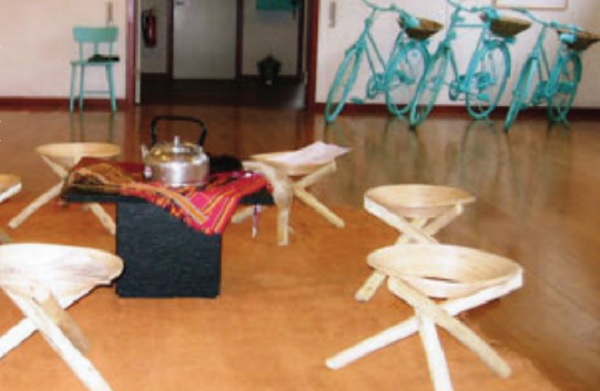
Top artists, rural women, and foreign activists create perfect space to find out at Makerere
Kampala, Uganda | DOMINIC MUWANGUZI | Makerere Art Gallery in Kampala is hosting an exciting show titled `Taboo Exhibition’. Part of the thrill is the novelty of it creation, the nature of its installations, and the brains behind the works.
Light blue painted bicycle are the focus of the exhibition space. Next to the bicycle installation, however, is a set of well laid out seats, with table, tea kettle, and the day’s newspapers. The brightly coloured setting is enticing. But wait a minute; it is taboo for a man to sit on them! Any man who dares sit is fined Shs1000. Only women can freely sit on them.
It is a form of reverse discrimination and the impact is immediate and direct. It also becomes clear that the nice blue bicycles are symbolic of items that women in rural areas of Uganda are denied. It is taboo for women to ride bicycles and it leaves them having to walk long distances to the market or hospital while the men ride. They feel discriminated.
This reversal works as men confront the physical and psychological discomfort women routinely face in the face of male privilege. The men are forced to feel the pain of being denied satisfaction, something women often endure. The aim is to illustrate the unfairness of gender discrimination.
Incidentally, most of the artwork in the exhibit is created by men and women under an organisation called `Bishozi Art Movement’, founded by Swedish artist, Annette Mirembe Rosati. She says when she started work in Bishozi, a village in Kiruhura district in South Western Uganda; she was struck by how women were blocked from many activities.
“They were not allowed to do many things in the community because they were women,” she says, “As a woman I felt this had to change and I began a platform to encourage teamwork between men and women.”
She also realised that gender equality without women having control over their lives was hollow. So she started literacy programs where women learn to read, write, and count. They also learn money making skills to end women’s economic disfranchisement, which Rosati realised was a major problem.
Rosati runs the programme with a team; including Andrew Kivumbi, Nema Vinkeloe, Biggi Vinkeloe and Lilian Mary Nabulime, the renowned sculptor from Makerere University in Kampala. According to Rosati, the interventions have made the women in this tiny rural village more confident and reduced chances of their being exploited.
The group has a `goat bank’ where the women are encouraged to acquire a goat; which is a pricy possession in the community. Previously, only men could own goats. For the rural woman, it is an automatic gateway to economic empowerment. So Nabulime showcases sculptures of goats in mixed media in the exhibit and when the goats are sculptured in motion, it is to depict the forward march of the rural women.
Taboo exhibition is an excellent opportunity to talk about gender imbalance; a topic often stifled in many communities. Linking such an enterprise with art gives it added purpose as the art allows the rural population to express themselves without inhibition.
The Bishozi National Movement works with 700 people from thirteen villages.
 The Independent Uganda: You get the Truth we Pay the Price
The Independent Uganda: You get the Truth we Pay the Price



